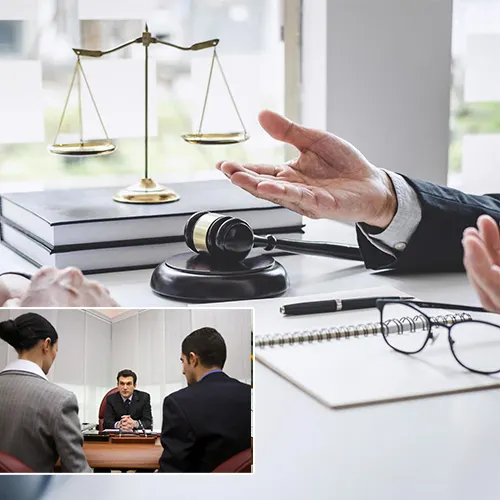Understanding DUI Checkpoint Legality: Know Your Rights
Table of Contents []
DUI Checkpoint Legality
Understanding the Legality of DUI Checkpoints

DUI checkpoints are a common sight on our roads, serving as a tool in the fight against impaired driving. At Arnold Placek & Foerster PC, we recognize the need for these checkpoints and the conversation they stir around individual rights and public safety. It's vital to our mission to shed light on the legality of such measures and to make sure that each one of you knows your rights when approaching a DUI checkpoint. Armed with knowledge, you are better prepared to make informed decisions.
The procedures that law enforcement must follow are strictly outlined in laws and protocols, and these need to be strictly adhered to. Our resources will guide you through what to expect at a checkpoint, the rights you retain, and the boundaries that should not be crossed by law enforcement. Remember that while DUI checkpoints are meant to protect, they should also respect the lines drawn by the law.
Your safety and rights are paramount. We want you to feel confident, should you ever drive through a checkpoint. That's why we're here to help educate you on DUI Checkpoint Legality. If questions arise or you face legal issues related to DUI checkpoints, don't hesitate to reach out to us at (512) 341-7044.
DUI Checkpoints: A Brief Overview
DUI checkpoints, also known as sobriety checkpoints, are roadblocks set up by law enforcement agencies to check drivers for signs of intoxication or impairment. These checkpoints are announced in advance and must be placed in locations that have been studied for high incidents of drunk driving. The goal is to deter those who may consider driving under the influence and ultimately keep our streets safer.
DUI checkpoints may seem like an inconvenience, but their effectiveness in catching impaired drivers and preventing alcohol-related accidents is well-documented. Our resources can give you a better understanding of how they work and why they are an integral part of public safety efforts.
Your Rights at a Checkpoint
It is crucial to know that while law enforcement has the authority to conduct sobriety checks, you as a driver have rights that must be respected. You have the right to remain silent, to decline a search if there's no probable cause, and to be treated with dignity and respect.
Our team at Arnold Placek & Foerster PC ensures you're aware of these rights. If at any point you feel your rights have been violated, it's important to stay calm and composed. Taking down officer names, badge numbers, and gathering any witness contact information can be incredibly helpful. And always remember, you can seek legal guidance by calling us at (512) 341-7044.
When Issues Arise
Problems at DUI checkpoints can manifest in various ways, whether it's a misunderstanding about your rights or an officer overstepping their bounds. Our goal is to equip you with the knowledge to defuse such situations, understanding when and how to express your rights.
Should you find yourself in hot water despite your best efforts to comply, remember that we are here to assist you. Your next step should be seeking legal advice from experts who can navigate the complexities of DUI checkpoint encounters.
Procedures Law Enforcement Must Follow

Law enforcement officers are bound by specific rules when it comes to DUI checkpoints. They can't just set up a roadblock whenever and wherever they please. There are constitutional guidelines in place meant to protect citizens while enabling officers to do their job effectively. At Arnold Placek & Foerster PC, we think you should be familiar with these protocols.
Checkpoints must be set up in a logical location, announced to the public in advance, and officers must follow a predetermined plan - which means they can't selectively target vehicles without a consistent system. Understanding this process can reduce the stress of going through a checkpoint and knowing if procedures are correctly being followed can provide peace of mind or an indication of when something is amiss.
Selection of Vehicles
At a DUI checkpoint, you might notice that not every car is stopped. Officers typically use a pattern, like stopping every third car, to avoid accusations of discrimination. This method ensures that the process is random and fair, adhering to legal standards that govern these checkpoints.
If you find yourself selected, knowing that this is part of an established pattern and not personal targeting can ease anxiety.
Conducting Field Sobriety Tests
If you are stopped, an officer may ask you to perform field sobriety tests. This is standard procedure if an officer has reasonable suspicion that a driver is under the influence. These might include a walk-and-turn test or a one-leg stand test. You have the right to decline these tests; however, refusal might lead to further legal action.
Always remember that you should only be asked to perform such tests if there's a valid reason to suspect impairment. If you feel you've been asked unfairly, it's important to narratively detail the experience, which can be discussed later with legal counsel.
Use of Breathalyzers and Chemical Tests
Breathalyzers and chemical tests are common tools used by officers at DUI checkpoints to measure blood alcohol content (BAC). Just like with field sobriety tests, there are laws about how and when these tests can be administered. For instance, implied consent laws mean that by driving, you've agreed to submit to these tests if lawfully requested.
If you're asked to take a breathalyzer or chemical test and feel unsure about it, you have the option to contact a lawyer to understand your options better.
How Arnold Placek & Foerster PC Can Help You

When it comes to navigating DUI checkpoints, we understand that you might feel overwhelmed. We aim to be the beacon you turn to for clarity and support. Our dedicated team is ready and waiting to answer your questions and offer the legal resources you might be seeking.
We are committed to ensuring that you receive fair treatment and that your rights are upheld. If you encounter a situation at a DUI checkpoint that feels unjust, we have expert attorneys who specialize in these cases and can offer the representation you might need.
Legal Expertise and Representation
If you find yourself needing legal assistance, we can connect you with attorneys who have extensive experience with DUI checkpoint cases. They can review your situation, advise on the best course of action, and represent you in court if necessary.
Bear in mind, having professional legal counsel can make all the difference in resolving any issues stemming from a DUI checkpoint encounter. Our attorneys know the ins and outs of such matters and can help protect your rights.
Resources at Your Fingertips
We provide a plethora of information that can be easily accessed online. Our resources guide you through the legal landscapes of DUI checkpoints, break down procedures, and inform you about your rights. It's all part of our commitment to keep you well-informed.
From articles to FAQs, we ensure that you have the insights you need. And if any content raises further questions or if you need more in-depth assistance, you're always welcome to give us a call at (512) 341-7044.
Educational Outreach
Knowledge is power, especially when it comes to legal matters. Our objective isn't just to offer reactive support but to proactively educate the community on DUI checkpoint legality and rights. We hold workshops, webinars, and produce educational content so that you're prepared ahead of time.
Our educational initiatives are designed to foster awareness and prevent any potential issues before they occur. Keep an eye on our calendar for upcoming events and make the most of these opportunities to enrich your understanding.
Connect With Us for Further Assistance

At Arnold Placek & Foerster PC, we stand by the importance of knowing your rights and the legal protocols that govern DUI checkpoints. Our commitment to you goes beyond just providing information; we're here to offer support and connect you with top-notch legal experts when needed.
If you're feeling uncertain about a past DUI checkpoint encounter or just want to learn more about your rights, don't hesitate to get in touch. Our team is always ready to help. Your peace of mind is our priority.
Get Your Questions Answered
You might have questions right now that need answers. That's what we're here for. Whatever your queries might be, from understanding the specifics of checkpoint procedures to seeking advice after an encounter, our team is just a phone call away.
Remember, no question is too small or too complex for us to tackle. So whether it's day or night, don't hesitate to call us at (512) 341-7044 for the answers you deserve.
Schedule an Appointment
Need to talk to someone about your DUI checkpoint experience? We can arrange a consultation for you. Our attorneys are ready to sit down with you, discuss your experiences, and advise accordingly.
Scheduling an appointment is simple and can be the first step towards resolving any concerns or legal issues. Just give us a ring, and we'll take care of the rest.
Let Us Be Your Legal Ally
When it comes to DUI checkpoints, having a legal ally can make a significant difference. Our breadth of expertise and network of skilled attorneys mean that you'll never have to face any complications alone.
Trust in us to be the guiding force in understanding and challenging any DUI checkpoint issues that might surface. Reach out today and let us be the advocate you need.
For any concerns or enquiries, please call Arnold Placek & Foerster PC at (512) 341-7044. We're nationally recognized for providing stellar information and legal connections within the realm of DUI checkpoint laws. Count on us to stand by you every step of the way, ensuring you're never left in the dark about your rights or legal processes. It's our mission to keep you informed so that you can drive with confidence and peace of mind. Call now!